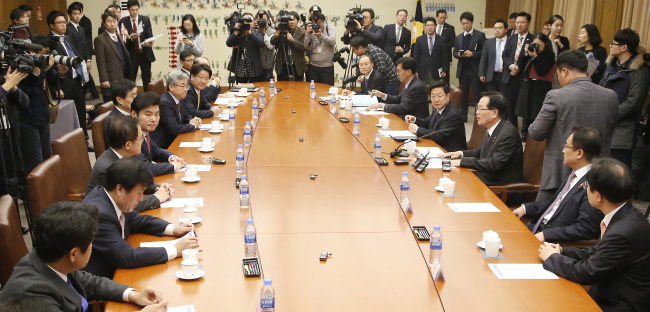A negotiation impasse at the National Assembly is proving hard to break, as rival parties refuse to yield their position on provisions embedded in a set of controversial economic bills aimed to relax regulations on business activity.

The bills in question are the Service Industry Development Act and Special Act for Boosting Business (both of them provisional names in English). The former was drafted by the government in July 2012 and the latter was coauthored in July 2015 by Rep. Lee Hyun-jae of the ruling Saenuri Party, with the support of 26 of his fellow lawmakers
The Service Act is designed to offer tax benefits and state funding to service-related businesses and their efforts to invest in research and development. The law aims to offer bureaucratic assistance to entrepreneurs who want to build their own service firms and help them expand into overseas markets.
The Special Act, often referred to as a “one-shot act,” aims to simplify related regulations for companies looking to restructure their businesses suffering from an oversupplied market. The bill would provide companies with tax benefits and financial assistance.
Both bills remain stuck in the National Assembly’s relevant committees by the opposition parties. The New Politics Alliance for Democracy, however, has hinted at the possibility of breaking the legislative deadlock if “toxic provisions” were to be revised.
“I think we should not put stigma on the bills before even reviewing them. We should most definitely be engaging in full-fledged negotiations if that can lead to us bridging the gaps and taking toxic clauses out of the bills,” said NPAD lawmaker Rep. Jun Byung-hun last Wednesday. NPAD chairman Moon Jae-in reportedly acknowledged Jun’s remark.
The most contentious provision in the Service Act is Article 2, which defines the scope of the service industry. According to Article 2 of the Service Act, the law shall be applied to any service industry related to economic activities, except for agriculture, fisheries and manufacturing.
The government and ruling Saenuri party assert the bill would create jobs and boost the economy. State-run research organization Korea Development Institute forecast the bill would create up to 690,000 jobs by 2030 and raise the potential economic growth rate by 0.2 to 0.5 percentage points.
The NPAD asserts that since the provision is applicable to “any service industry,” the bill will classify the “medical and health industry” into the service sectors, allowing exemption from government regulations and pave the way for the privatization of the public health care system.
For instance, the liberal parties highlight that deregulation of the medial industry would allow for-profit hospitals to mushroom in Korea, a country that has been touted for its universal health insurance system that enables patients to pay affordable prices to receive medical treatments at big hospitals.
While the NPAD demands the pending bill be revised and “explicitly” stipulate the exemption of the medical and health industry from service sectors in the article that defines the law’s applicability, the Saenuri Party refutes that the bill can “virtually” protect the public health care system without the change.
The Saenuri party cites Article 3, which stipulates that the Medical Service Act supersedes the Service Act. It argues that Medical Act Articles 4, 15, 33 and 49 have provisions that protect the nation’s public health system.
The most debated provision in the “one-shot act” is Article 25, a provision that grants conglomerates an extended period of one year, up from six months, to reorganize their circular shareholding ownership structures and streamline their businesses to comply with regulations.
Though the current law stipulates that companies with assets exceeding 5 trillion won ($4.26 billion) are banned from making circular equity investments in a sister firm, they can do cross shareholdings only when they restructure their business. However, they are required to dispose of the shares within six months.
The government and the ruling party contend that the six-month restriction can force companies to sell off shares at prices cheaper than designated. They also cautioned that the companies might face difficulty securing resources to meet the tight deadline.
But the NPAD argues that such businesses have the capacity to voluntarily or preemptively execute restructuring and that the extension can decrease transparency in management structure and thereby raise the risks of stakeholders, creditors and laborers.
They also point out that the bill could create a loophole for chaebol owners to pass down their assets to their heirs illegally or to achieve control of their business empires despite tiny personal shareholdings, suggesting the conglomerates should be exempt from the law.
The Saenuri Party has refuted this notion, saying the bill would be toothless unless it were applied to the chaebol, who suffer from oversupplied global markets such as steel manufacturing and shipbuilding. The party also highlights that the bill has a provision that prevents chaebol from abusing the legislation.
The law’s Article 10 Clause 4 stipulates that the government can refuse to authorize the corporations’ business reorganization plans if the restructuring is designed to reinforce the conglomerate owners’ business governance or pave the way for passing down the conglomerate to heirs.
By Yeo Jun-suk (jasonyeo@heraldcorp.com)







![[KH Explains] Hyundai's full hybrid edge to pay off amid slow transition to pure EVs](http://res.heraldm.com/phpwas/restmb_idxmake.php?idx=644&simg=/content/image/2024/04/18/20240418050645_0.jpg&u=20240419100350)






![[From the Scene] Monks, Buddhists hail return of remains of Buddhas](http://res.heraldm.com/phpwas/restmb_idxmake.php?idx=652&simg=/content/image/2024/04/19/20240419050617_0.jpg&u=20240419175937)

![[KH Explains] Hyundai's full hybrid edge to pay off amid slow transition to pure EVs](http://res.heraldm.com/phpwas/restmb_idxmake.php?idx=652&simg=/content/image/2024/04/18/20240418050645_0.jpg&u=20240419100350)

![[Today’s K-pop] Illit drops debut single remix](http://res.heraldm.com/phpwas/restmb_idxmake.php?idx=642&simg=/content/image/2024/04/19/20240419050612_0.jpg&u=)